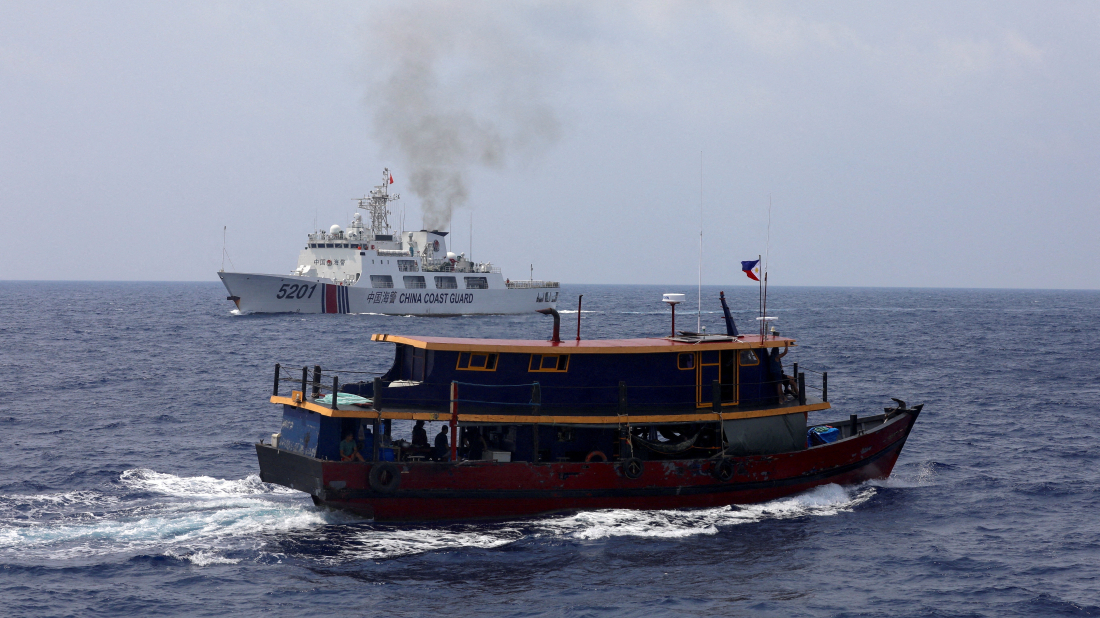Ankara condemns US-Israeli attack on Iran as ‘clear violation of international law’
Türkiye’s President, Recep Tayyip Erdoğan, has described the ongoing U.S.–Israeli military campa...

China has launched a new phase of combat readiness patrols around Huangyan Dao (Scarborough Shoal) in the South China Sea, escalating tensions in one of the world’s most contested maritime zones.
The move comes in direct response to recent joint military drills between the United States and the Philippines, and underscores the increasingly confrontational dynamics unfolding in the Indo-Pacific region.
The People’s Liberation Army (PLA) Southern Theater Command confirmed on May 31 that the patrols, involving both naval and air units, began in early May and are aimed at reinforcing what Beijing calls its right to safeguard national sovereignty and regional stability.
However, the deployment of PLA forces around Scarborough Shoal—a territory within the Philippines’ exclusive economic zone (EEZ) as defined by the United Nations Convention on the Law of the Sea (UNCLOS)—marks a direct challenge to international legal norms. In 2016, the Permanent Court of Arbitration in The Hague ruled that China had no legal basis to claim historical rights to the area, a verdict Beijing continues to reject.
A Geopolitical Flashpoint
The patrols follow closely on the heels of large-scale U.S.–Philippines joint military exercises, which included a simulation focused on retaking islands in the region—an operation perceived in Beijing as a thinly veiled rehearsal for countering Chinese advances. The temporal and geographic proximity of these maneuvers has heightened fears of miscalculation or accidental confrontation, particularly given the region’s density of surveillance and strategic deployments.
China’s use of the China Coast Guard to enforce maritime claims—through tactics like radio warnings, targeted surveillance, and vessel expulsions—has drawn international criticism. Analysts characterize these actions as part of a broader “grey zone” strategy that merges civilian, paramilitary, and military pressure to assert territorial claims without triggering outright conflict.
Strategic Implications
Scarborough Shoal lies about 220 kilometers west of Luzon, within the Philippines’ EEZ. Though China seized effective control in 2012, Manila and its Western allies—including the U.S., which is bound to the Philippines by a mutual defense treaty—continue to press for the shoal’s demilitarization and for the enforcement of the 2016 legal ruling.
The latest PLA operations reflect a calculated effort to reshape the strategic status quo, projecting power across disputed waters and signaling resolve against regional cooperation efforts championed by ASEAN nations and Western powers.
Military analysts warn that China’s approach—characterized by incremental territorial control and rejection of international arbitration—marks a shift from law-based maritime governance to power-based assertion. The PLA’s visible presence around Scarborough Shoal is not only symbolic but also operational, enhancing Beijing’s deterrence capability and complicating freedom of navigation efforts by other states.
Outlook
With the U.S. reaffirming its defense commitments to the Philippines and regional military activity intensifying, the South China Sea appears set for a period of heightened tension and strategic brinkmanship. While open conflict remains unlikely, the increasing pace and complexity of interactions between rival forces raise the stakes in one of the world’s most critical maritime corridors.
The Kremlin is utilising the recent United States and Israeli military strikes on Iran to validate its ongoing war in Ukraine. Russian officials are pointing to the escalation in the Middle East as evidence that Western nations do not adhere to international rules.
Saudi Arabia’s state oil giant Saudi Aramco closed its Ras Tanura refinery on Monday following an Iranian drone strike, an industry source told Reuters as Tehran retaliated across the Gulf after a U.S.-Israeli attack on Iranian targets over the weekend.
The Middle East crisis intensifies after the deadly attack on the compound of the Supreme Leader of Iran Ali Khamenei on Saturday that killed him, other family members and senior figures. Iran has launched retaliatory strikes on U.S. targets in the region.
U.S. President Donald Trump said the U.S. military has enough stockpiled weapons to fight wars 'forever' in a social media post late on Monday. The remarks came hours before conflict in Iran and the Middle East entered its fourth day.
Türkiye raised its security level for Turkish-flagged vessels in the Strait of Hormuz to Level 3 on Sunday (2 March). The development follows Iranian restrictions on shipping after U.S. and Israeli strikes and confirmation of Supreme Leader Ali Khamenei’s death.
The United Nations has called for an investigation into a deadly attack on a girls’ primary school in Iran, which Iranian officials say has killed more than 100 children. The U.S. has said its forces “would not” deliberately target a school.
U.S. first lady, Melania Trump chaired a UN Security Council meeting on children and education in conflict on Monday (2 March), a move criticised by Iran as hypocritical following U.S. and Israeli strikes that triggered a UN warning about risks to children.
Start your day informed with AnewZ Morning Brief. Here are the top news stories for the 3rd of February, covering the latest developments you need to know.
Canadian Prime Minister Mark Carney arrived in Australia on Tuesday (3 March), aiming to bolster relations between the two so-called "middle powers" amid what he has called a "rupture" in world order.
Former U.S. President Bill Clinton told lawmakers that President Donald Trump told him he had "some great times" with convicted sex offender Jeffrey Epstein before their relationship soured, according to a video released on Monday (2 March).
You can download the AnewZ application from Play Store and the App Store.

What is your opinion on this topic?
Leave the first comment